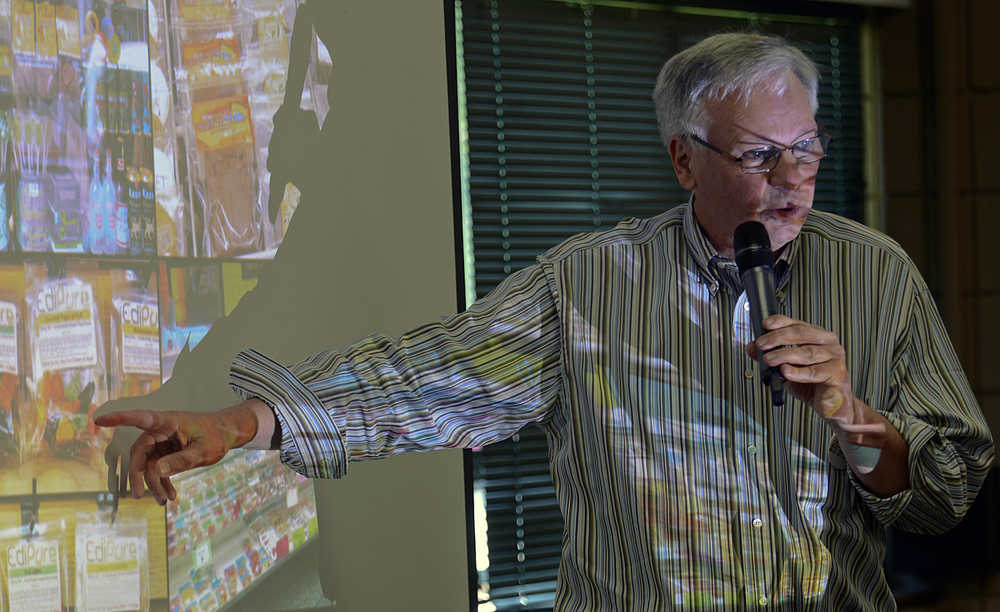A joint Kenai and Soldotna chamber luncheon was awash in marijuana slang and fresh-baked brownies Tuesday as the merits of a ballot measure to legalize the substance in Alaska were debated.
About 30 people gathered to hear Taylor Bickford, a representative from the Campaign to Regulate Marijuana Like Alcohol and Tom Tougas, of Big Marijuana. Big Mistake, discuss Ballot Measure 2, which will allow voters to decide in November whether Alaska should become the latest state to legalize marijuana.
The ballot measure is labeled as an act to tax and regulate the production, sale and use of marijuana in the state and would make use of the substance legal for Alaskans who are at least 21 years old.
During his presentation, Bickford likened the criminalization of marijuana use to the failed attempt to ban alcohol during America’s Prohibition.
“Alcohol prohibition was an abject failure in this country, it lasted for 13-years and it stopped nothing,” Bickford said. “What it did was it criminalized otherwise law-abiding adults for using alcohol … it was extremely wasteful. Our federal government spent millions of dollars trying to fight a war that couldn’t be won.”
Bickford said smoking marijuana was “objectively safer” than drinking alcohol — yet being caught with pot could have long-lasting detrimental affects on Alaskans.
“When you get arrested on a marijuana offense in this state, good luck finding a job, good luck getting a college scholarship, it puts your life on hold and we know that people who have an interaction like this with the criminal justice system are much more likely to become repeat offenders, they’re much more likely to end up in prison.”
Tougas said the issue was not whether people could smoke the substance, rather that the ballot initiative would create a commercialized pot industry in the state, one that promoted the message that smoking pot was a normal and accepted part of life.
“We oppose the initiative because we’ve read it,” Tougas said. “I’ve read every word of the initiative, we oppose the initiative because it’s extreme. We oppose this initiative because it legalizes the industrialization and commercialization industry at the expense of our children, our employees and our state.”
Tougas’ presentation focused primarily on the marketing of marijuana in states that had legalized the substance, and on the consequences of legalization and the resulting commercial marijuana-selling industry’s affect on Alaska’s workforce and youth.
After the dueling presentations, several residents asked questions of the two debaters including Robyn Sullens, of Kenai, who asked Tougas several questions.
“Sir, have you ever used marijuana?” Sullens said.
“No, I have not,” Tougas said.
“OK,” Sullens said. “If your wife or child was on their death bed and marijuana could save them, Would you allow them to take marijuana, yes or no?” Sullens said.
“Yes,” Tougas said. “And this is not about medical marijuana.”
Sullens said she was asking “yes” or “no” questions.
“Does your group believe that there are professionals that are responsible and have been using marijuana for years, yes or no?” Sullens said.
“I can’t speak for the group,” Tougas said. “I’m a volunteer, all I can do is speak for myself and I’m sure there are professional people that use marijuana and they’re doing it legally now and I don’t have any objection to that.”
Sullens said she took issue with a portion of Tougas’ presentation during which he said that the marketing of various pot edibles in other states using cartoon characters and candy, were primarily targeted at children.
“Sir, I like lollipops and suckers. I still watch cartoons. So if you’re saying that they’re marketing toward kids, that’s not true because I like lollipops. I’m 45 years old,” she said.
Soldotna-resident Patricia Patterson said she had to delve into the process of buying marijuana after her son got sick.
“Once I got it on my property, I was OK to give to my son when he was getting very, very, very ill from chemotherapy,” she said. “During the process of buying marijuana … I thought I was committing a crime.”
Alaska’s voters will get a chance to weigh in on Ballot Measure 2 on Nov. 4.
Reach Rashah McChesney at rashah.mcchesney@peninsulaclarion.com

